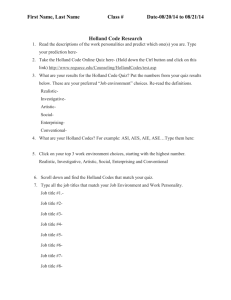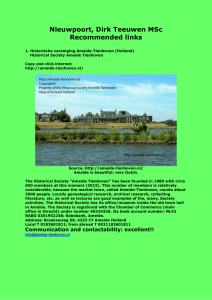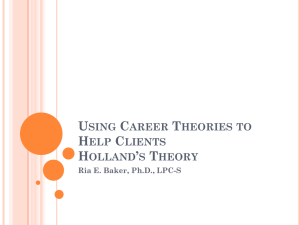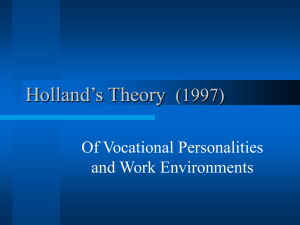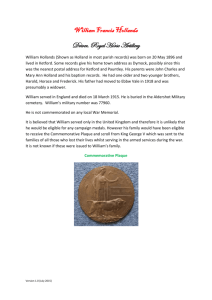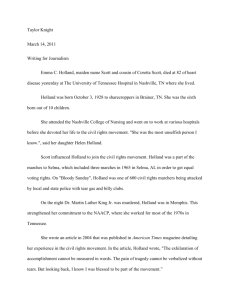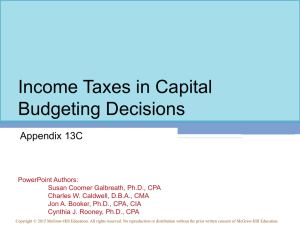Hollands Theory
advertisement
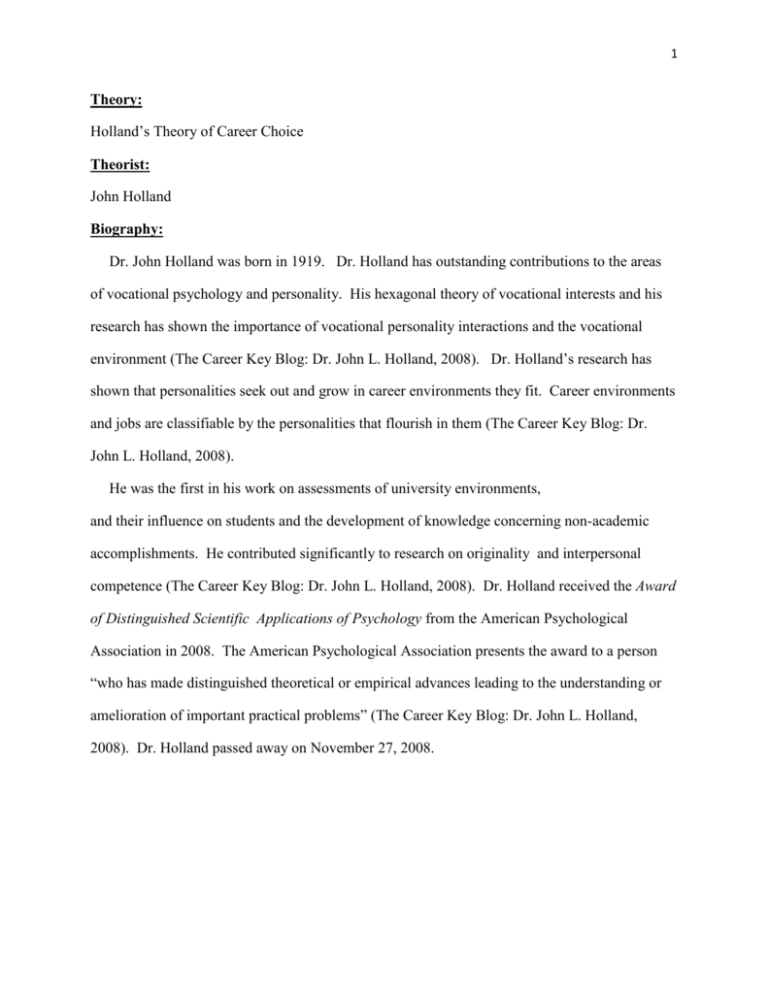
1 Theory: Holland’s Theory of Career Choice Theorist: John Holland Biography: Dr. John Holland was born in 1919. Dr. Holland has outstanding contributions to the areas of vocational psychology and personality. His hexagonal theory of vocational interests and his research has shown the importance of vocational personality interactions and the vocational environment (The Career Key Blog: Dr. John L. Holland, 2008). Dr. Holland’s research has shown that personalities seek out and grow in career environments they fit. Career environments and jobs are classifiable by the personalities that flourish in them (The Career Key Blog: Dr. John L. Holland, 2008). He was the first in his work on assessments of university environments, and their influence on students and the development of knowledge concerning non-academic accomplishments. He contributed significantly to research on originality and interpersonal competence (The Career Key Blog: Dr. John L. Holland, 2008). Dr. Holland received the Award of Distinguished Scientific Applications of Psychology from the American Psychological Association in 2008. The American Psychological Association presents the award to a person “who has made distinguished theoretical or empirical advances leading to the understanding or amelioration of important practical problems” (The Career Key Blog: Dr. John L. Holland, 2008). Dr. Holland passed away on November 27, 2008. 2 Description of Theory: There are two different kinds of Career Development Theories- Structural and Developmental Theories. Structural Theories- “focus on individual characteristics and occupational tasks,” (Career Development Theory and Process, n.d.). Developmental Theories- “focus on human development across life span,” (Career Development Theory and Process, n.d.). John Holland was a Structural Theorist. Under the Structural Theory lies another theory- Trait and Factor Theory. “This theory began with Parsons, who proposed that a choice of a vocation depended upon (1) an accurate knowledge of yourself, (2) thorough knowledge of job specifications, and (3) the ability to make a proper match between the two,” (Career Development Theory and Process, n.d.). Unfortunately, there are still two major assumptions of the trait and factor theory that are part of career counseling today. Those are: “(1) that individuals and job traits can be matched (2) that close matches are positively correlated with job success and satisfaction,” (Career Development Theory and Process, n.d.). Holland based his theory on that people find jobs based on what is reflective of their personality type. People seem to be attracted to certain types of work, thus the environment then is reflective of their personality. Holland classified personality types and work environments into six categories. Those categories are: Realistic, Investigative, Artistic, Social, Enterprising, and Conventional- and this is often referred to the acronym RIASEC. Holland believed the closer the match of the personality to the job- the greater the satisfaction (Career Development Theory, 2003). Each individual can resemble all types- all types are in every person. One type is shows strongest- Holland also stated that a person may even show up to three types. He developed a hexagon model to illustrate his concepts of: Consistency, Differentiation, Identity, and Congruence. See Figure One. 3 Realistic Conventional Enterprising C R E S I A Investigative Artistic Social Figure One The Realistic type likes to work with their hands and things- tools and machines. Occupations that fall into that category are farmers, carpenters, and mechanical engineers. The Investigative personality type likes to work with information- abstract ideas and theories. A good match would be a chemist. The Artistic personality likes to create things. Some occupations suggested are painters or writers. The Social personality is someone who likes to help others. Occupations for that personality are social workers or counselors. The Enterprising type of personality likes to lead. They would be good as sales representatives or an entrepreneur. Last, the Conventional Personality likes to organize data. A good match might be an auditor (Career Development Theory, 2003). Holland’s theory tends to be applicable for both genders. However, the downside is that there has been some question that females tend to score higher in the female-dominated areas of work- which tend to be social, artistic, and conventional. However, Holland’s theory 4 places an emphasis and accuracy on self- knowledge and knowledge of careers to make necessary decisions regarding one’s occupational choice (Career Development Theory and Process, n.d.). Theory Measurements and Instrumentation: The Career Key and the Self-Employment Key tests as well as other versions of The Career Key test have been adapted in order for use in other countries. These tests are scientifically valid and measure the six personality types of Holland’s Theory of Career Choice (The Career Key Blog: Dr. John L. Holland, 2008). When using career tests, be sure to choose tests that are scientifically valid measures. Many career tests are invalid and can actually harm the individual. If the individual is not sure if the career test is valid, they may visit this website: http://www.careerkey.org/asp/your_personality/beware_harmfull_tests.asp Other assessment instruments that may be used which measure congruence, differentiation, consistency, and vocational Identity are: Self- Directed Search –SDS (Reardon, 1999), Vocational Preference Inventory (Big Picture View of Career Development Theory, n.d.),, Strong Interest Inventory (Big Picture View of Career Development Theory, n.d.), My Vocational Situation, and Position Classification Inventory. Reported by: Holly S. McVay 5 References: Beale, A. V. (2001). Emerging career development theories: a test for school counselors. Retrieved 9-10-09 from http://findarticles.com/p/articles/mi_m0KOC/is_1_5/ai_80306017/ Big Picture View of Career Development Theory, (n.d.). Retrieved December 10, 2009 from http://ccdf.ca/ccdf/NewCoach/english/ccoache/e4a_bp_theory.htm Career Development Theory, (2003). Retrieved September 23, 2009 from http://taracat.tripod.com/careertheory1.html Career Development Theory and Process, (n.d). Retrieved September 23, 2009 from http://www.virtualhabitats.com/Students/CareerCounselorWebquest/Career%20Develop ment%20Theory.pdf Chen, C. P. (2003). Integrating perspectives in career development theory and practice-Articles. Retrieved 9-23-2009 from http://findarticles.com/p/articles/mi_m0JAX/is_3_51/ai_100389274/ From social learning to happenstance, (2004). Retrieved September 23, 2009 from http://www.guidance-research.org/EG/impprac/ImpP2/traditional/learning-theory Overview of Career Development Theories, (n.d). Retrieved September 23, 2009 from http://www.google.com/search?hl=en&source=hp&q=overview+of+career+development +theories&aq=f&oq=&aqi= Overview of Career Development Theory, (n.d). Retrieved September 23, 2009 from http://extension.psu.edu/workforce/briefs/overviewcareerdev(insert).pdf Reardon, R. & Lenz, J. (1999). Holland’s Theory and Career Assessment. Journal of Vocational Behavior, 55, 102-113. The Career Key Blog: Dr. John L. Holland, 1919-2008. (2008). Retrieved December 10, 2009 from http://careerkey.blogspot.com/2008/12/dr-john-l-holland-1919-2008.html 6 Understanding and applying theories of career development, (2008). Retrieved September 10, 2009 from http://wps.prenhall.com/chet_niles_career_2/25/6587/1686373.cw/index.html
